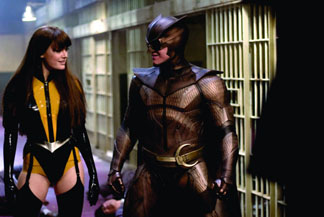Book vs. Movie
Watchmen
By Russ Bickerstaff
March 9, 2009
Being based on pre-existing characters, there wasn't anything terribly original about the cast of Watchmen. Furthermore, the plot, which featured a single gleaming hero taking utopian heroism to its bitter, bloody extreme, was nothing new either. Stories of heroism taken to fascist extremes go back to the golden age of pulp sci-fi and were nothing new in the ‘80s. What makes Watchmen so brilliant is not the story that's being told, but rather the way the story is being told. We see a complicated picture of these characters emerge in a way that can only really be revealed in comic book format — multiple different visual clues give a feel for a character's personality as well as their dialogue and information revealed in the text-based pages found at the end of each chapter. More so than standard text-based novels, one does not read Watchmen so much as walk into it. By using the kind of static, unmoving density of the comic book page to its fullest extreme in a way that had never really been seen before, the Watchmen comic book is considered by many to be one of the best books of the 20th century. It is interesting to note in light of this the fact that it's far from being the author's best work. His spoken word piece The Highbury Working was far more accomplished in the depth of its stylistic details and sheer beauty of its composition. His graphic novel Brought to Light is a much more chilling look at human nature in 20th century politics. His text-based novel Voice Of The Fire was considerably better storytelling. Relatively few people have heard of these works. For better or worse, Moore's most acclaimed work is destined to have been Watchmen.
The Movie
Director Zack Snyder deserves a considerable amount of credit for trying to be as true to the comic book as possible. He has been credited with having gone so far as to using the panels of the comic book as storyboards for the film. A previous director was rumored to have wanted to update the story from the mid-'80s to a more contemporary era. From a certain perspective, this would have made sense — sure, the graphic novel was set in the 1980s, but that's when it was WRITTEN. Wouldn't it make sense to bring the story into a more contemporary setting? Yes, but it would lose track of the ‘80s Cold War themes that so inspired the original novel. It also would have displaced the mid-20th century setting that formed the backbone of the story.
Snyder's attention to detail with respect to the ‘50s, ‘60s, ‘70s and ‘80s is impressive. Costuming, sets, technology - every aspect of the style fits together remarkably well, except for the music. The scoring for scenes set in the story's "contemporary" ‘80s does feature some direct references to music of the era, but it's more of a distraction than anything. As Dr. Manhattan's origin flits across the screen, we hear Philip Glass' score for Koyaanisqatsi. Rorschach is leaving Dan Dreiberg‘s workshop and we can hear a distinct, un-credited cue almost lifted verbatim from Vangelis' score to Bladerunner. Moments like these give the film an anxious feeling — it wants to be brilliant and ahead of its time. It wants to be as brilliant as its source material and seems to think it can do so by associating itself with brilliance, but it only serves to remind the viewer of the brilliance they're NOT seeing. The music isn't all distracting, however. Adrian Veidt is discussing the future of technology with a group of people in his office tower and we can hear a Muzak version of Tears For Fears' Everybody Wants To Rule The World. It's a subtle reference, but it's frighteningly clever. The film is at its best when it's doing those things that combine sound with moving pictures in a way truly unique to film that advances the central themes explored in the story.
Continued:
1
2
3
4
|
|
|
|




